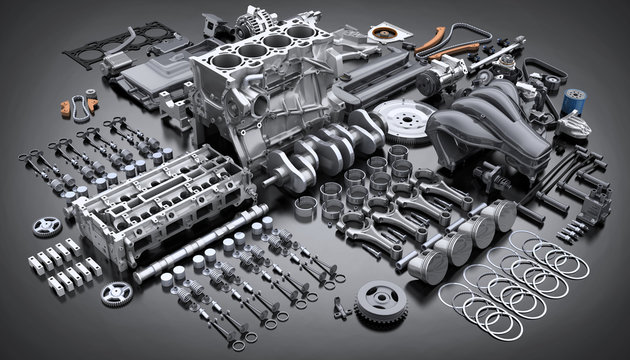
Your vehicle’s engine is the heart of its performance, and just like a human heart, it needs proper care. Ignoring early signs of engine trouble can turn a simple, affordable fix into a wallet-draining repair. By recognizing the top five signs your engine components need immediate attention, you can prevent costly breakdowns, extend your car’s life, and drive with confidence.
Car engines are made of multiple interconnected components, and when one part starts to fail, others soon follow. That’s why spotting issues early is key. Let’s dive into the top five warning signals that every driver should know.
OEM stands for Original Equipment Manufacturer. These are the same parts your car had when it rolled off the assembly line, made either by the automaker or their authorized suppliers.
An engine in good health runs smoothly and quietly. If you start hearing unusual sounds, it’s often your car’s way of telling you something’s wrong.
● Knocking or Pinging: Could suggest worn bearings or poor fuel combustion.
●
Grinding:
May indicate worn belts or issues with the alternator.
Strange noises often mean metal parts are rubbing or colliding in ways they shouldn’t. Left unchecked, this can lead to engine failure. A small repair today could save you thousands tomorrow.
Your car’s exhaust is another major indicator of engine health. Changes in smoke color usually point to serious problems.
●
Indicates oil burning in the combustion chamber.
●
Common causes include worn piston rings or valve seals.
●
Usually means coolant is leaking into the engine.
●
Could be a blown head gasket or cracked engine block.
●
Suggests too much fuel is being burned.
●
May be due to clogged air filters or malfunctioning injectors.
Ignoring exhaust smoke is dangerous because it could mean your engine is close to permanent damage.
Modern cars are smart. They’ll often tell you something’s wrong before you feel or hear it.
The check engine light is one of the most common warnings. While it can mean something minor like a loose gas cap, it can also indicate serious problems like misfires, oxygen sensor failure, or catalytic converter damage.
●
Oil Pressure Light: Signals low oil, which can destroy your engine quickly.
●
Temperature Light: Warns of overheating, often due to coolant leaks.
●
Battery Light: Suggests issues with the alternator or charging system.
Never ignore these lights. They’re designed to save your engine from catastrophic damage.
If your car isn’t performing like it used to, don’t shrug it off.
A) Acceleration Problems :
Sluggish acceleration may indicate clogged fuel injectors, dirty air filters, or failing spark plugs.
B)
Rough Idling and Stalling : If your car shakes or stalls while idling, it could be a sign of ignition problems, vacuum leaks, or faulty sensors.
A drop in performance doesn’t just reduce driving comfort—it also puts strain on other engine parts.
Engines should be sealed systems. If you notice leaks or strange smells, that’s a red flag.
●
Common around gaskets and seals.
●
Can lead to engine wear from lack of lubrication.
●
Usually show up as green or orange puddles under the car.
●
Lead to overheating, one of the fastest ways to ruin an engine.
●
Strong gas smells may mean a fuel leak.
●
These aren’t just bad for the engine they’re dangerous for you.
Catching leaks early keeps your car safe and your repair bills lower.
Q1: How often should I service my car’s engine?
A: Most vehicles benefit from service every 5,000–7,500 miles, depending on the manufacturer’s guidelines.
Q2: Can I still drive with the check engine light on?
A: It’s risky. Some issues may be minor, but others can cause severe damage if ignored. Have it checked as soon as possible.
Q3: Why does my car smell like burning oil?
A: This usually means oil is leaking onto hot engine parts. It should be fixed immediately to avoid fire hazards.
Q4: What’s the cost of fixing engine problems early vs. late?
A: Fixing a small leak might cost under $200, while replacing a full engine can exceed $5,000.
Q5: Is it safe to ignore small leaks under my car?
A: No. Even small leaks can turn into major problems. Always investigate fluid spots.
Your car gives you warning signs when something’s wrong—don’t ignore them. From strange noises to dashboard lights, each symptom is your engine’s cry for help. Addressing problems early not only saves you money but also keeps your car reliable and safe on the road.
If you notice any of these top five signs your engine components need immediate attention, act quickly. Regular maintenance and prompt repairs will ensure your vehicle runs smoothly for years to come.